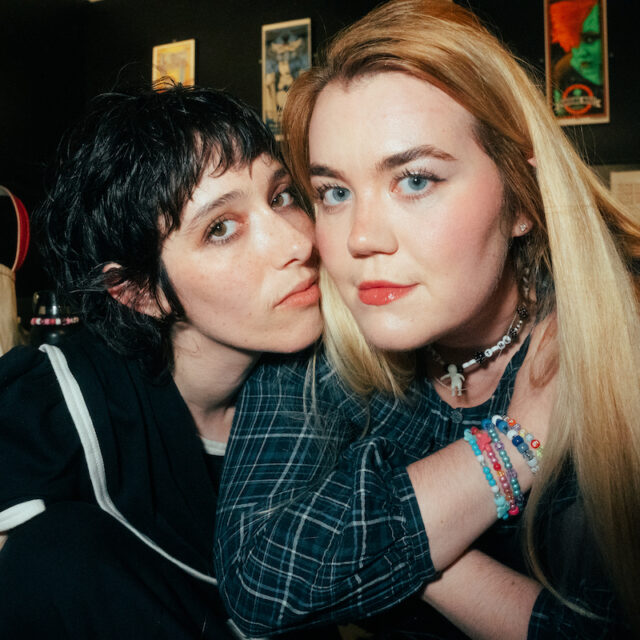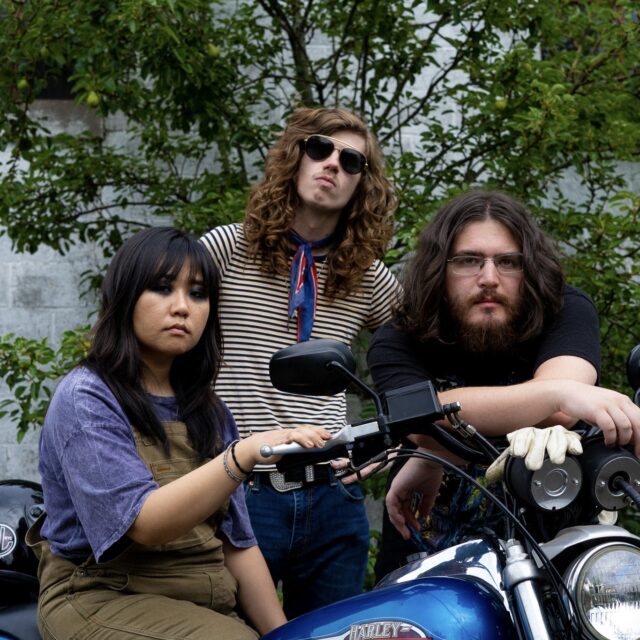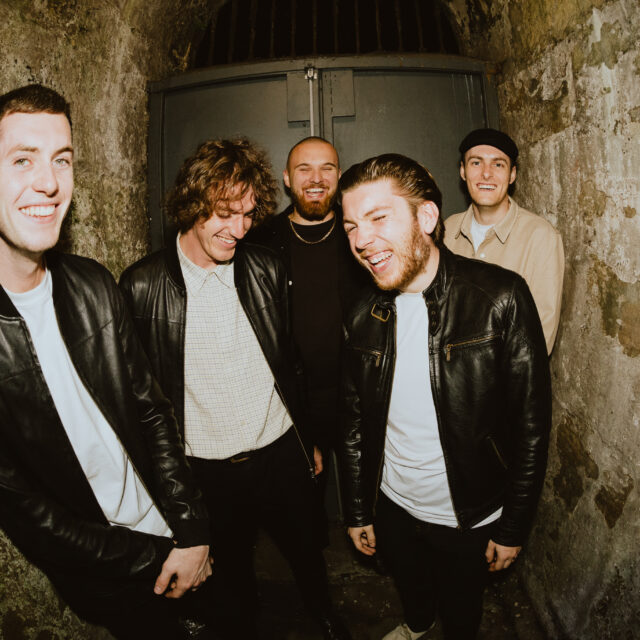INTERVIEW: City of the Sun on signing to Decca/Paragon and the new record

In covering music for these years I’ve been doing it, I’m very self aware that I’m not an expert on every style of music out there. No where near it. So when I’m prepping for an interview with a band and I’m not super familiar with their style, I strive in those interviews, this time it being NYC raised City of The Sun, to have the interview be educational. Not just on what the band is up to but also to take a look into how they create their music. What works for them, how they approach it. And I think that this new interview is a strong example of that.
In my interview with the trio, Zach Para, Avi Snow, and John Pita, just an hour or two before they took the stage to a packed Great Scott in Allston, we sat down on the front patio in an intimate conversation about their origins in busking, plan for releasing music over the next year and so much more. The band has a packed schedule for touring already announced, including a US run in early 2020, and are sure to not slow down anytime soon.
I know from just looking at social media, you have a huge Europe run coming up. You already announced US dates for next year. A lot coming up but you’re doing these East Coast dates, you just released the track “La Luz”. Maybe preparations for this tour going into it, maybe what people should look forward to in these sets?
Avi Snow: We actually just got off a tour recently. So for this tour, I feel like we dove right into it sort of.
John Pita: We also spent some time recording the new album so we were playing these songs a lot. So I think that helped us prepare as we started playing live again. We played Webster Hall recently so we rehearsed a lot for that. So I think that was a natural evolution for this tour. Just from recording, playing that show and now this. It’s been kind of organic.
Maybe how long has the record been in the making for you? How long was that recording process?
Zach Para: I think it lasted for around three months, is that right? It was broken up.
JP: We’d do like two weeks, stop for a month, then do two weeks. But those weeks were every single day, for like twelve hours a day.
AS: So, I guess total recording, it took a month of actual studio time.
ZP: Plus all the other processes we’re pretty spread out. The writing process before that, the mixing, mastering.
AS: Some of the songs, we wrote a week before we went into the studio. There’s a few songs we’ve had for a little bit, we’ve been playing them. Then other ones came up pretty much right before we had to go into the studio.
ZP: Which was awesome.
AS: Yeah, because I think we all like some of those songs the best that came out at the last minute. I think they’re some of our favorites off the record.
ZP: They’re my favorites. It was refreshing. We just kind of sat down and it just kind of happened. We had like three ideas in one day in a matter of four hours that made it on the record. And they are some of my favorite tracks.
And you’ve been working together for so long. So I’m sure it comes along pretty naturally.
JP: Yeah, especially because we played in the street for so long. So we have somewhat of a formula. We don’t stick to it too religiously but we kind of stick to those things. Different frequencies we use and stuff like that on each instrument and then we kind of play around with those. So I think that that makes it super easy. It’s like a map. Then we change it up as well obviously.
AS: It’s almost like when an idea comes into the room, we know how to develop it. That part of it, is something that we’ve done a lot. The content can be completely new and different and refreshing but we know at this point how to develop it.
And I know from reading about it, you did start out by busking. Was it always something where it was instrumental music or was it something that came later in the process?
JP: It was always instrumental. I can’t sing for shit but we really didn’t sing. It was one of those things where we started playing and it was just jamming at first and it was like, ‘Oh shit, people are responding to this, like really remarkably.’ So we kind of just kept doing it.
Obviously it worked. Then how did it come about getting signed to Universal?
JP: Well it is also with Decca/Paragon and they’re pretty experimental. They’re like art music as they call it
Oh yeah, because it’s one of their imprints.
AS: Yeah, the imprint that were on, apparently we fit really well for what they had in mind.
JP: They call it neo-classical.
AS: Yeah it’s more of an urban tinge then most classical music.
JP: Its like a new style, electronic elements and all these other things. So it fits. The guy that brought us there, he was managing a band that we had opened for at Bowery Ballroom and he saw us busking. He was like, “Oh are you guys still with that manager? Are you guys signed. You should come into the label, I think people would be interested.” Then within a month, we were having meetings with them. It’s kind of cool how it all worked out.
So you’ve been still busking this whole time?
JP: We haven’t busked in a while.
AS: What was the last time we busked? Like four or five months ago or something like that. So it’s not that far off. And it’s not like we said, oh we’re done busking. I’m sure we’ll find ourselves busking sometime soon. We’ve just been really busy touring and recording so we just haven’t had as much time to busk. When we were younger, we were a little less busy I guess.
JP: We had nothing else to do besides busk.
ZP: That’s all we did back in the day.
AS: Well that was our strategy. That was our plan. It was busk til we got signed, well it wasn’t specifically to get signed.
JP: Until we found success of some kind.
Then to kind of wind it up, your schedule, it’s pretty stacked the next few months. So you clearly believe in this record, the people behind you believe in this record. So maybe in approaching this recording process, some of the songs were super new, super fresh. Maybe something really new you tried in this process? Has it become a regular routine between the three of you?
JP: I think for us to make new music, it’s pretty easy. It’s just about us getting into a room and being inspired. But I think that happens when we have time off. Then we always write something. We may write something in soundcheck but we might not really develop it until we have free time.
AS: Some of the ideas we kind of pick up along the way. Then when it comes down to it, when we need some material, then we’ll like bring in all those ideas. Certain ones float to the top, certain ones don’t and, that’s it.
Then you have these East Coast dates, you’re playing a festival in Brazil, you’re going to Europe. Maybe focuses or goals for these next few months. Is it going to be getting this record out, more touring.
ZP: It’s finished. “La Luz”, a song off of it, was released yesterday. The second track of the album. But every month, a new track will be coming out. There’s 12 total. So we have 12 more months to go then we’ll release the album.
That’s a great way to release it. It’s a different time for music.
ZP: Yeah, so we’ll be focusing on touring. Writing new music. We’re focusing on promoting it as well, but it’s pretty much in auto pilot for the most part. Just keep the momentum going is the idea.



